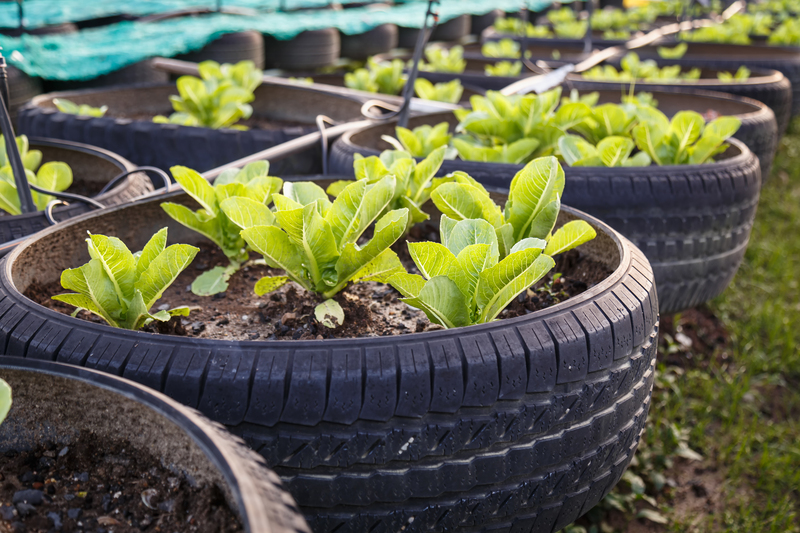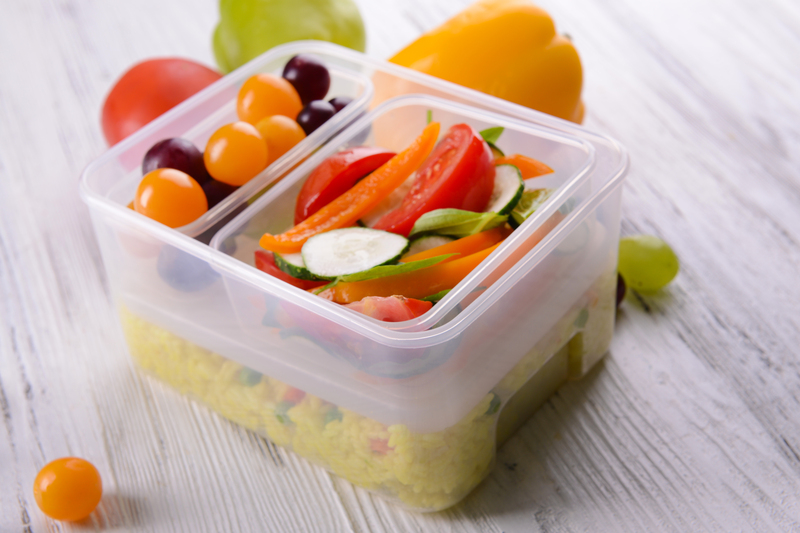Discover Innovative Ways to Improve Your Home Recycling Strategy
Are you determined to make your household more eco-friendly this year? Developing an effective home recycling strategy is one of the best ways to reduce waste, save resources, and support a cleaner planet. But recycling can be more than tossing cans and bottles into a blue bin. To maximize your efforts and minimize contamination, it pays to learn new, creative, and practical approaches. Whether you're a recycling beginner or looking to take your habits to the next level, this comprehensive guide will help you discover innovative ways to improve your home recycling strategy.

Why Updating Your Recycling Habits Matters
It's easy to feel like a single household can't make a difference--but that couldn't be further from the truth. In fact, the combined impact of millions of families practicing smarter recycling can:
- Divert tons of waste from landfills, reducing landfill space requirements.
- Preserve valuable resources and energy by reusing materials.
- Protect wildlife by minimizing pollution and habitat destruction.
- Reduce greenhouse gas emissions produced by traditional waste disposal.
Your home recycling plan can help shape a more sustainable future--especially if it's innovative and tailored to your unique lifestyle.
Assessing Your Current Home Recycling System
Before you make improvements, take a thorough look at your current setup. Ask yourself:
- Do I have clearly labeled sorting bins?
- What materials does my local recycling service accept?
- Where do most errors or contaminants occur in my household?
- Am I throwing away items that could be recycled or reused?
Understanding your starting point is crucial to building an effective recycling strategy at home.
Innovative Ways to Improve Your Home Recycling Strategy
Create a Smart Sorting System
Standard blue bins are only the beginning! To truly boost your residential recycling strategy:
- Use multiple, color-coded bins for plastics, metals, paper, glass, and compostables.
- Label bins in multiple languages or with images if you have children or guests in your household.
- Post a simple guide on the fridge with common accepted/not accepted items for quick reference.
- Place bins in high-traffic areas (kitchen, bathrooms, garage) for convenient recycling access.
Tame the Confusion: Learn Local Recycling Rules
Recycling programs differ from city to city--and those differences matter! One of the most critical steps in upgrading your home waste management plan is to check with your local hauler or municipality:
- Download or print their accepted materials list.
- Find out what types of plastics they process--not all numbers are accepted everywhere.
- Ask how to prepare recyclables (e.g., rinse containers, remove caps, flatten cardboard).
- Sign up for text or email reminders about changes to the collection schedule or accepted items.
An up-to-date recycling knowledge base is an easy way to prevent wish-cycling and contamination.
Leverage Technology for Smarter Recycling
Tech tools can revolutionize your eco-friendly home recycling strategy:
- Use recycling apps like iRecycle, Recycle Coach, or local municipal apps to check what goes where, collection days, and special event drop-offs.
- Set smartphone reminders for recycling and compost pickup schedules.
- Track your waste and recycling output with digital logs to see your progress.
- Follow reputable environmental organizations on social media for real-time recycling tips & community challenges.
Harnessing technology can refine your recycling workflow and new habit formation--plus, it keeps the whole family engaged.
Composting as Part of Your Home Recycling Plan
Many households overlook the impact of food waste. In fact, organic waste like fruit and vegetable scraps constitutes a large portion of residential trash, yet it can easily be recycled at home by composting.
- Start a backyard compost bin or use a kitchen compost pail and transfer to a local drop-off.
- Compost coffee grounds, egg shells, tea bags, and yard waste--but avoid meats and fats unless you have a specialized system.
- Use the finished compost to fertilize your garden and houseplants, closing the recycling loop.
Integrating composting turns your home into a zero-waste powerhouse and cuts landfill methane emissions dramatically. Composting is a crucial pillar of a comprehensive home recycling strategy.
Get Serious About Reducing and Reusing
While recycling is vital, a truly innovative recycling plan begins with waste prevention:
- Switch to reusable bags, bottles, and containers to keep unnecessary packaging out of your bins.
- Shop in bulk and support brands with minimal or recyclable packaging.
- Find creative reuse ideas for glass jars, plastic tubs, and cardboard--perfect for storage, crafts, and organization.
- Donate, repurpose, or upcycle clothing, electronics, and furniture instead of discarding them.
Embracing "reduce and reuse" significantly lightens your recycling load--the best waste is the one that never occurs!
Address Hard-to-Recycle Items with Specialized Solutions
Many products can't go in your curbside bin, but that doesn't mean they should be landfilled:
- Use mail-back programs or retailer take-back services for ink cartridges, electronics, batteries, and light bulbs.
- Contact local recycling events for hazardous waste, paint, or bulky plastics (like rigid clamshells).
- Look for textile recycling boxes in your area for old clothes, shoes, and linens.
Sorting out these materials ensures a more sustainable and innovative home recycling solution.
Make It a Family Affair
Successful home recycling isn't just a one-person job. To truly build an advanced household recycling strategy:
- Assign recycling jobs to kids or roommates, like rinsing, sorting, or taking bins out.
- Turn recycling into a family challenge, tracking how much you divert from the trash weekly or monthly.
- Incorporate recycling education into family reading or games (puzzles about sorting are fun for kids!).
When everyone takes responsibility, your home's eco-footprint shrinks faster--and good habits stick for life.
Upgrade Your Home Recycling Equipment
Sometimes, the right tools make all the difference in your home sustainability strategy:
- Compact recyclables (cans, cartons, cardboard) with a household baler or crusher to save bin space.
- Invest in stackable or space-saving recycling bins for small homes or apartments.
- Install a kitchen recycling station with sliding bins under the sink for cleaner collection.
- Add outdoor storage for recyclables to keep pests away and bins organized between pickups.
Modern, convenient storage increases compliance and keeps your home recycling routine efficient.
Stay Updated on Recycling Innovations & Trends
The recycling landscape is always changing. New materials, processes, and local rules develop every year. To keep your home recycling system cutting-edge:
- Sign up for your city's recycling newsletter or follow local government social media accounts.
- Attend community recycling workshops to learn about new programs and technology.
- Explore up-and-coming solutions like recycling for flexible plastics, bioplastics, and curbside textile pickup.
- Advocate for neighborhood or building-wide recycling improvements if you live in a shared space.
This keeps your home recycling process fresh, relevant, and maximally impactful.

Maximizing Your Impact through Community Engagement
Taking your personal recycling strategy to the next level means reaching beyond your front door.
- Host a recycling information session or swap event to educate others about best practices.
- Join or start a neighborhood green team to advocate for improved infrastructure or bulk drop-offs.
- Volunteer for local clean-ups to encourage proper waste disposal throughout your community.
- Support businesses with robust recycling programs or request changes if local shops aren't doing enough.
Your voice and actions can inspire others, multiplying your household's positive impact--and making sustainable living the norm, not the exception.
Conclusion: Building the Ultimate Home Recycling Strategy
A truly innovative approach to recycling at home isn't about working harder--it's about working smarter. By harnessing technology, community resources, education, and the latest trends, you can create a personalized, powerful recycling plan that makes the most of every can, bottle, box, and scrap in your home. Remember, every positive step counts. Start with one or two of these fresh ideas and build from there. With a thoughtful approach, your advanced home recycling strategy will not only protect the environment, but also inspire those around you. Together, we can turn recycling from a chore into a lifestyle--one household at a time!
Ready to start transforming your habits? Take action today, and watch your home's recycling system become a model of innovation and sustainability!